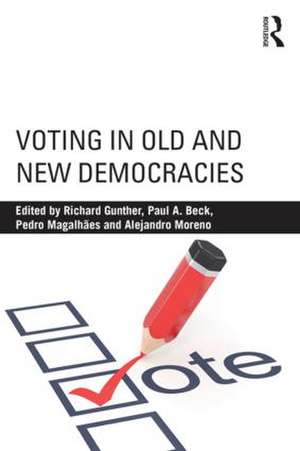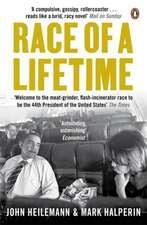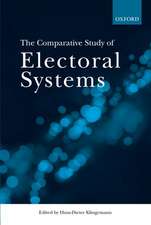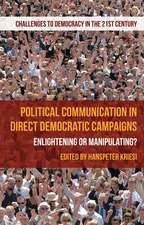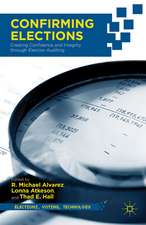Voting in Old and New Democracies
Editat de Richard Gunther, Paul A. Beck, Pedro C. Magalhães, Alejandro Morenoen Limba Engleză Paperback – 7 aug 2015
Written in a clear and accessible style, Voting in Old and New Democracies significantly advances our understanding of citizen attitudes and behavior in election settings.
| Toate formatele și edițiile | Preț | Express |
|---|---|---|
| Paperback (1) | 469.38 lei 6-8 săpt. | |
| Taylor & Francis – 7 aug 2015 | 469.38 lei 6-8 săpt. | |
| Hardback (1) | 1115.21 lei 6-8 săpt. | |
| Taylor & Francis – 10 sep 2015 | 1115.21 lei 6-8 săpt. |
Preț: 469.38 lei
Nou
Puncte Express: 704
Preț estimativ în valută:
89.81€ • 94.04$ • 74.50£
89.81€ • 94.04$ • 74.50£
Carte tipărită la comandă
Livrare economică 10-24 aprilie
Preluare comenzi: 021 569.72.76
Specificații
ISBN-13: 9781138913325
ISBN-10: 1138913324
Pagini: 342
Ilustrații: 34 black & white illustrations, 43 black & white tables, 34 black & white line drawings
Dimensiuni: 152 x 229 x 20 mm
Greutate: 0.45 kg
Ediția:1
Editura: Taylor & Francis
Colecția Routledge
Locul publicării:Oxford, United Kingdom
ISBN-10: 1138913324
Pagini: 342
Ilustrații: 34 black & white illustrations, 43 black & white tables, 34 black & white line drawings
Dimensiuni: 152 x 229 x 20 mm
Greutate: 0.45 kg
Ediția:1
Editura: Taylor & Francis
Colecția Routledge
Locul publicării:Oxford, United Kingdom
Public țintă
Postgraduate and UndergraduateCuprins
Selected Contents: 1. Introduction Pedro C. Magalhães, with Paul A. Beck, Richard Gunther and Alejandro Moreno 2. Global Patterns of Exposure to Political Intermediaries Paul A. Beck and Richard Gunther 3. Mobilization, Informal Networks and the Social Contexts of Turnout Pedro C. Magalhães, with Paolo Segatti and Tianjian Shi 4. Value Cleavages Revisited Alejandro Moreno 5. The Changing Determinants of the Vote Richard Gunther, Marina Costa Lobo, Paolo Bellucci and Marco Lisi 6. Parties, Elections, Voters and Democracy Robert Mattes, with Saiful Mujani, R. William Liddle, Tianjian Shi and Yun-han Chu 7. Intermediation, Mobilization and Citizen Participation: Findings from In-Depth and Longitudinal Analyses of Spain Richard Gunther, José Ramón Montero and Hans-Jürgen Puhle 8. Conclusion Alejandro Moreno, with Paul A. Beck, Richard Gunther and Pedro C. Magalhães
Notă biografică
Paul A. Beck is Professor Emeritus of Political Science at the Ohio State University.
Richard Gunther is Professor Emeritus of Political Science at the Ohio State University.
Pedro C. Magalhães is principal researcher at the Institute of Social Sciences of the University of Lisbon and scientific director of the Francisco Manuel dos Santos Foundation.
Alejandro Moreno is Professor of Political Science at the Instituto Tecnológico Autónomo de México (ITAM), and Director of Public Opinion Research at Reforma newspaper, both in Mexico City.
Richard Gunther is Professor Emeritus of Political Science at the Ohio State University.
Pedro C. Magalhães is principal researcher at the Institute of Social Sciences of the University of Lisbon and scientific director of the Francisco Manuel dos Santos Foundation.
Alejandro Moreno is Professor of Political Science at the Instituto Tecnológico Autónomo de México (ITAM), and Director of Public Opinion Research at Reforma newspaper, both in Mexico City.
Recenzii
'This book is essential reading for all scholars interested in the democratic role of elections. Analyzing a unique database consisting of survey data from 18 countries it provides important new insights into the relevance of political intermediation through the communications of mass media, political organizations and ordinary citizens for democratic politics on a global scale.' —Rüdiger Schmitt-Beck, University of Mannheim
'This insightful book makes productive use of innovative survey questions from a wide range of countries to shed light on long-neglected questions regarding how voters acquire and direct their concerns onto the objects of electoral choice: political parties. In so doing the study introduces an apparently new term to the lexicon of political behavior: "political intermediation." The study uses this concept as a lens with which to focus attention on the role of intermediaries (family, friends, the media, and social groups) in framing political choices: roles that appear to condition decisions in the voting booth.' —Mark N. Franklin, European University Institute
‘La evidencia presentada en Voting in Old and New Democracies ensancha la agenda de investigación sobre el comportamiento político-electoral en el mundo, poniendo sobre la mesa la importancia de factores como los canales de intermediación política –que influyen en la relación entre partidos políticos y ciudadanos–, los cuales suelen estar ausentes en el análisis de la decisión de voto. Dicha contribución, sumada a la relevancia que se le da al proceso de modernización –ahora experimentado a través de cambios tecnológicos que se viven en el mundo con el uso de las redes socio-digitales y el Internet– indican que el estudio comparado del comportamiento electoral es todavía una agenda de investigación abierta a nuevas explicaciones teóricas y hallazgos novedosos. Voting in Old and New democracies contribuye a ello.’—Isaac Cisneros, Perfiles Latinoamericanos
'Voting in Old and New Democracies is a tour de force that dramatically improves scholarly understanding of why and how people turn out to vote and vote the way they do in a diverse group of democracies that vary dramatically in terms of their age, consolidation, level of economic development, and democratic quality. It is a book that I encourage all scholars of electoral behavior to read, and to read carefully.'—Mark P. Jones, Latin American Politics and Society
'Altogether, this is a very strong volume that clearly identifies both the strengths and limitations of comparative studies. It should find a place in every reading list on undergraduate and postgraduate modules in comparative political behaviour. It should also serve as a very reliable primer to more experienced researchers who need both a guide to the known terrain and a clear map as to where we go next.'—John Bartle, Party Politics
'This insightful book makes productive use of innovative survey questions from a wide range of countries to shed light on long-neglected questions regarding how voters acquire and direct their concerns onto the objects of electoral choice: political parties. In so doing the study introduces an apparently new term to the lexicon of political behavior: "political intermediation." The study uses this concept as a lens with which to focus attention on the role of intermediaries (family, friends, the media, and social groups) in framing political choices: roles that appear to condition decisions in the voting booth.' —Mark N. Franklin, European University Institute
‘La evidencia presentada en Voting in Old and New Democracies ensancha la agenda de investigación sobre el comportamiento político-electoral en el mundo, poniendo sobre la mesa la importancia de factores como los canales de intermediación política –que influyen en la relación entre partidos políticos y ciudadanos–, los cuales suelen estar ausentes en el análisis de la decisión de voto. Dicha contribución, sumada a la relevancia que se le da al proceso de modernización –ahora experimentado a través de cambios tecnológicos que se viven en el mundo con el uso de las redes socio-digitales y el Internet– indican que el estudio comparado del comportamiento electoral es todavía una agenda de investigación abierta a nuevas explicaciones teóricas y hallazgos novedosos. Voting in Old and New democracies contribuye a ello.’—Isaac Cisneros, Perfiles Latinoamericanos
'Voting in Old and New Democracies is a tour de force that dramatically improves scholarly understanding of why and how people turn out to vote and vote the way they do in a diverse group of democracies that vary dramatically in terms of their age, consolidation, level of economic development, and democratic quality. It is a book that I encourage all scholars of electoral behavior to read, and to read carefully.'—Mark P. Jones, Latin American Politics and Society
'Altogether, this is a very strong volume that clearly identifies both the strengths and limitations of comparative studies. It should find a place in every reading list on undergraduate and postgraduate modules in comparative political behaviour. It should also serve as a very reliable primer to more experienced researchers who need both a guide to the known terrain and a clear map as to where we go next.'—John Bartle, Party Politics
Descriere
Unlike most studies that focus their attention on established democracies or countries exclusively within one world region, this book presents a rigorous and innovative analysis of voting in elections in both old and new democracies in 18 countries on five continents between 1992 and 2007. Including new factors that have been neglected in previous studies of electoral politics, such as sociopolitical values and the influence of media, personal discussion, and organizational intermediaries, this book goes beyond voting to examine reactions to elections and their role in democratic politics.
